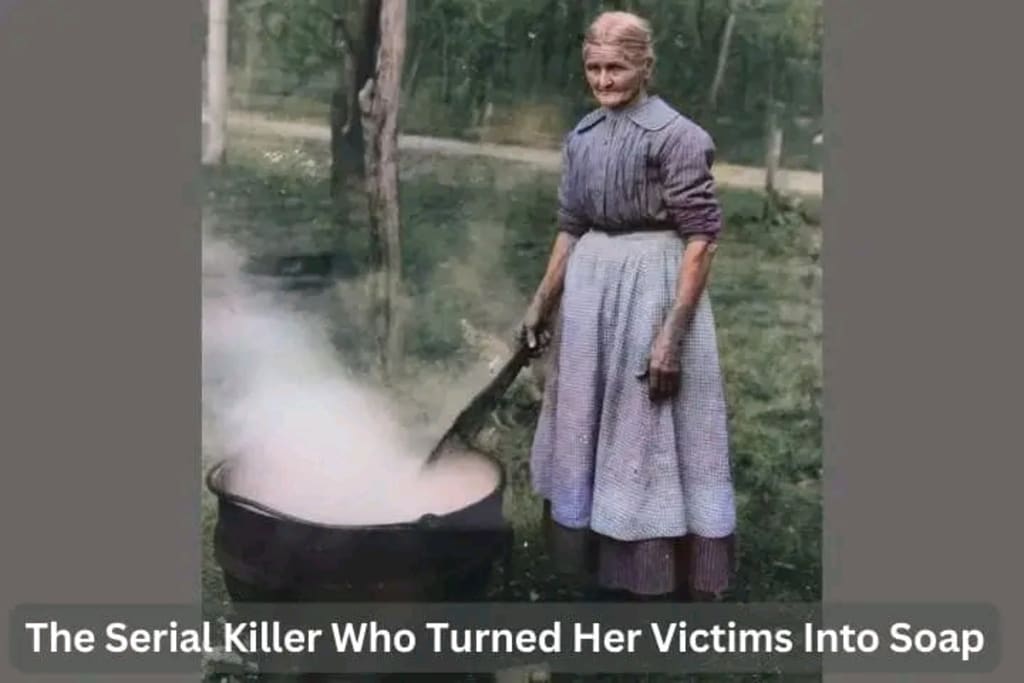Leonarda Cianciulli: The Serial K-Iller Who Turned Her Vi-Ctims Into Soap
In 1939 and 1940, Leonarda Cianciulli became widely known throughout the town for her homemade soaps and teacakes. But none of this sweet, middle-aged woman's houseguests knew her secret ingredient: the remains of the women she'd murdered. At least three times in those two years, Cianciulli would invite a woman over to her house, drug her wine, then butcher her with an axe before chopping her into little pieces to use for soaps and cakes.

Leonarda Cianciulli, a notorious Italian serial killer, gained infamy in the 1930s for her gruesome crimes. Known as the Soap-Maker of Correggio Cianciulli's macabre deeds were driven by a twisted belief that sacrificing lives would bring protection to her son during the turbulent times of World War II.
Born in Montella, Italy, in 1893, Cianciulli's early life appeared relatively unremarkable. She married Raffaele Pansardi in 1917 and later moved to the town of Correggio. Despite the appearance of a normal life, Cianciulli's mental state began to unravel as she became consumed by superstitions and a desire to shield her son from harm.
Cianciulli's criminal activities began in the 1930s when she claimed her first victim, Faustina Setti, in 1939. Convinced that human sacrifice would protect her son, Giuseppe, who was conscripted into the Italian army during World War II, Cianciulli lured Setti with promises of finding a suitable husband. Once at her home, Cianciulli drugged and killed Setti, later turning her remains into soap.
The second victim, Francesca Soavi, met a similar fate in 1940. Cianciulli convinced Soavi to move to a town for a job opportunity but instead murdered her. Soavi's remains, like Setti's, were transformed into soap. Cianciulli's crimes escalated with her third victim, Virginia Cacioppo, whom she persuaded to marry a fictitious man. Cacioppo, too, fell victim to Cianciulli's deadly concoctions, and her remains were turned into teacakes.
The police began to investigate the disappearances, leading them to Cianciulli. During questioning, she confessed to the murders, providing chilling details of her gruesome acts. In 1946, Cianciulli stood trial for her crimes. The court sentenced her to 30 years in prison and three years in a criminal asylum. Cianciulli's case shocked the public, not only for the brutality of her crimes but also for the bizarre reasons behind them.
Leonarda Cianciulli's life and crimes can be analyzed through the lens of psychological and sociological perspectives. Her descent into criminality appears rooted in a combination of personal psychological issues and the social turmoil of the time. The fear and anxiety generated by World War II may have contributed to Cianciulli's belief in extreme measures to protect her son. Additionally, her reliance on superstitions suggests a vulnerability to irrational beliefs, possibly exacerbated by societal stressors.
The case also raises questions about the role of mental health and the availability of support systems. Cianciulli's mental state and descent into criminal behavior highlight the importance of identifying individuals at risk and providing appropriate mental health resources. It is essential to explore the societal factors that may have contributed to her extreme beliefs and actions, shedding light on the need for a comprehensive understanding of mental health within the context of broader social issues.
The legacy of Leonarda Cianciulli serves as a haunting reminder of the capacity for extreme actions driven by a combination of personal struggles and external pressures. Her case remains a notable chapter in criminal history, prompting ongoing discussions about the intersection of mental health, societal influences, and criminal behavior. As society reflects on such cases, there is an opportunity to learn from the past and strive for a more compassionate and supportive approach to addressing mental health challenges, ultimately working toward preventing tragedies like those orchestrated by the Soap-Maker of Correggio.





Comments
There are no comments for this story
Be the first to respond and start the conversation.